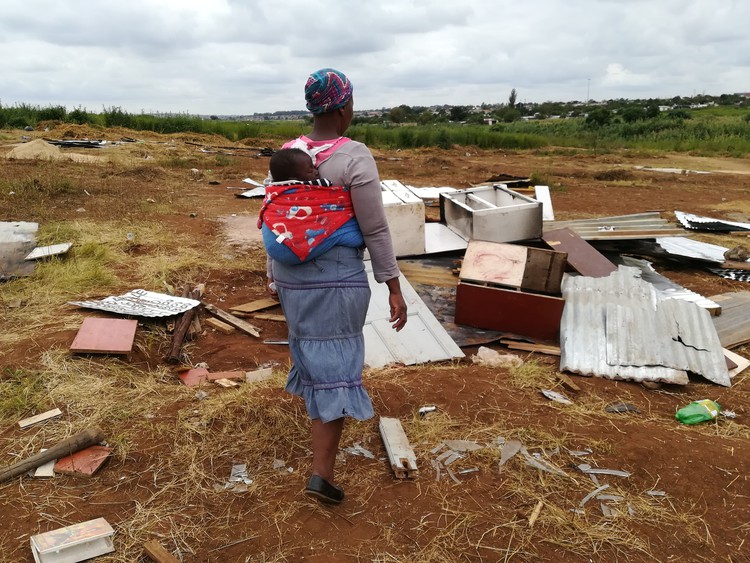
About 70 people were left homeless after their shacks were demolished in Tswelopele Extension 8, Tembisa, East of Johannesburg, on Thursday, 7 March. Photo: Zoë Postman
21 March 2020
Over 20 social justice organisations have called for an urgent moratorium on all evictions in light of the coronavirus pandemic, according to a joint statement released by Ndifuna Ukwazi on Friday.
This follows Chief Justice Mogoeng Mogoeng’s response to GroundUp’s question at a press conference in Midrand on 17 March, where he said if a property owner decided to have people evicted for any reason “we expect the normal course of litigation to be followed and for any presiding officer handling that matter to apply the normal principles”.
He said it will be business as usual at most courts across South Africa and most cases, like the issuing and execution of eviction orders, are expected to run their course.
Mogoeng’s statement came a few days after an eviction that was carried out by the City of Cape Town in Zweledinga informal settlement in Khayelitsha where about 40 shacks were demolished. The City said it was acting on a court order.
“The current business as usual response, that is, issuing eviction orders, implementing their execution or removing people from their homes (even without an eviction order by means of an interdict, municipal by laws or otherwise), does not consider the communicable nature of Covid-19 and how evictions and displacement will place a greater number of vulnerable people at risk,” read a letter addressed to the President’s Office and various ministers.
In the letter, the organisations said the moratorium should be declared under the regulations that followed the declaration of a national state of disaster.
Section 10 (8)(c) of the regulations says that the state may “take any other steps that may be necessary to address, prevent an escalation of the national state of disaster, or to alleviate, contain and minimise the effects of the national state of disaster”.
The organisations said that the moratorium would be a crucial step in minimising the effects of the coronavirus on vulnerable communities.
It was concerning that the judiciary’s plan to deal with the virus focused on the number of people in courtrooms and did not mention the effect of continuing with cases, like evictions, will have on vulnerable communities, said the organisations.
“One cannot practice physical distancing should you find yourself and your belongings on the side of the road or in an open space and exposed to the public with no means of protection. One cannot practice a heightened level of hygiene by washing hands in the recommended manner where the only access to water is a communal standpipe and shared ablution facilities in an informal settlement or in a transitional relocation area,” read the letter.
Housing is more important now than ever and the state must take measures to prioritise protecting the most vulnerable by preventing evictions that lead to homelessness, said the organisations.
“It cannot be business as usual when the country is facing a potential public health crisis which only stands to be exacerbated when scores of families are displaced or rendered homeless. Evictions that result in displacement or homelessness can significantly increase the spread of infectious diseases like Covid-19,” read the letter.